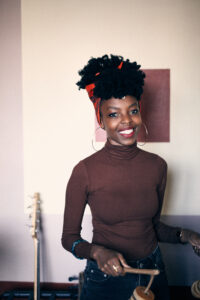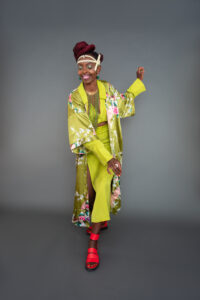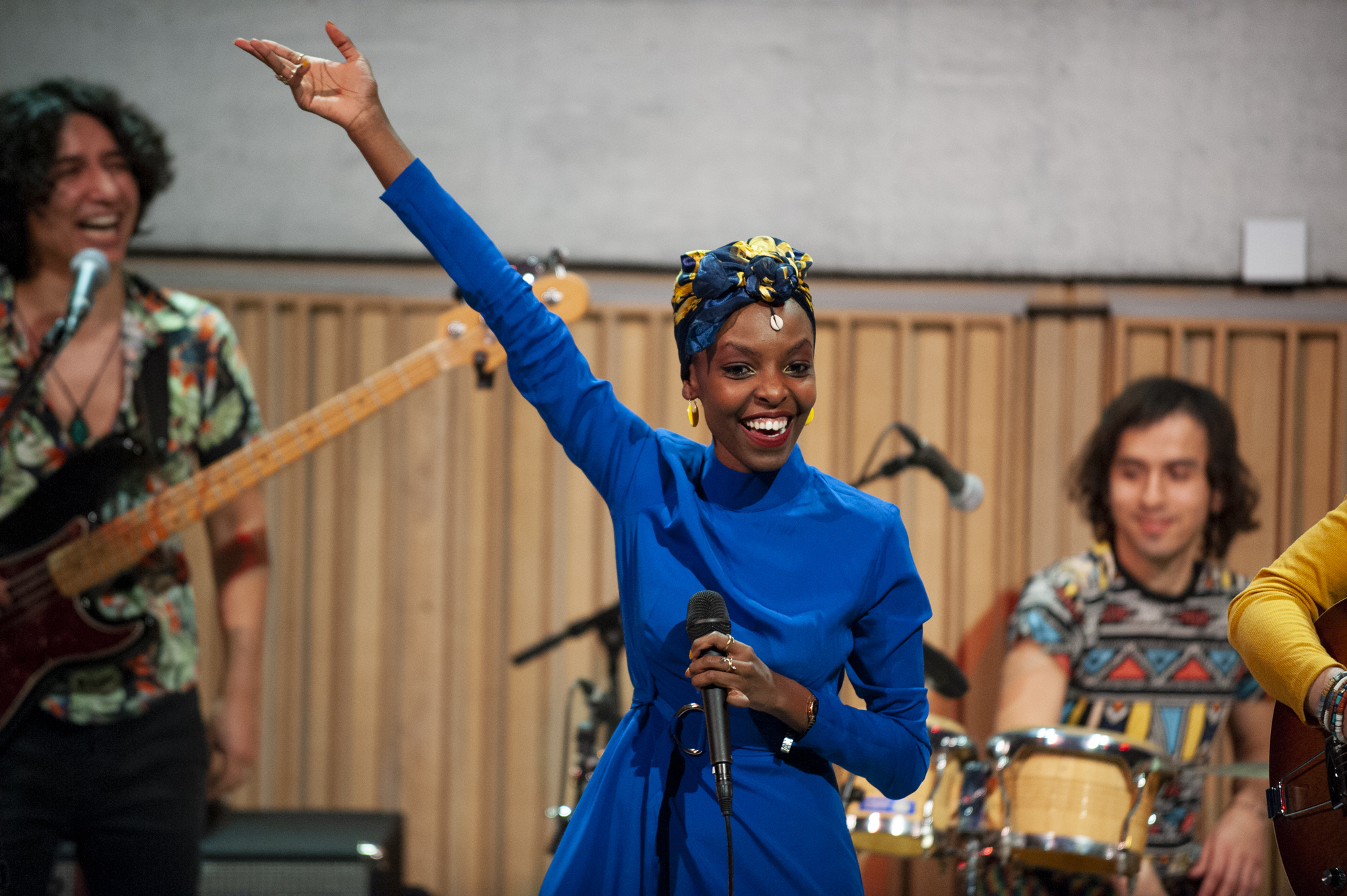Composer and singer Teta Diana has one home in Sweden and one in Rwanda. Based in Malmö and Kigali, she collaborates with musicians in both places. In 2022, Teta is in lead of the project Creating self-sustained music careers for women in Rwanda in collaboration with Mix Musik and a number of female musicians, DJ:s and producers. It is a Creative Force project, funded by the Swedish Institute.
Text: Karolina Jeppson
One afternoon in the end of November, I meet Teta at Café Sorl in Malmö. The sky is unusually grey, and a cold rain is falling. However, it is easy to cheer up in Teta’s company, and immediately we start to discuss a conference that she has joined recently in Malmö about women in the music industry.
– Malmö is a city of great artists but I constantly see how music organizers and the city of Malmö turn to artists from outside Malmö, instead of inviting our own talented musicians. Why is that?
Teta is astonished to discover that to reach out to the local musicians and bands is mainly non-existent.
– We struggle to get gigs and to be invited, all of us. Maybe I need to return to Rwanda, in order to be invited to play a concert in Malmö, she laughs.
Musical experiences from two countries
Having musical experiences from both countries, Teta knows about the struggle to find her ways in the music business. It is hard work, even more when being a woman in a male-dominated industry. In Malmö, she joins a course in culture project management, in order to get tools to navigate on the Swedish music scene. In Rwanda, the climate when it comes to women and music is harder.
– There is no protection for women on the music scene since it is still a fresh industry. Every door you knock on is opened by a man, and at times they can take advantage of that. Without space, tools or a safe network – perhaps some girls think that that’s the only way there is. I thought it was time to make women believe that they, themselves can be producers! I don’t know more than two female guitar players in Rwanda, no female bass player, maybe two professional female instrumentalists. What would happen if we could have a space to discuss these issues? And in exchange with Swedish female musicians, we could hear stories and discuss the solutions. No one should teach anyone, but rather discuss and learn from each other. Is it possible for women to be sound engineers?
With these thoughts, Teta approached Mix Musik, and a project plan was created which received funding from the Swedish Institute through their international program Creative Force.
– I am very engaged in the Rwandan music scene and in the project, that we now have received money for. I have my own organisation in Kigali for music production, called Sakwe Studios since 2014, Teta explains.
Gender equality
When it comes to gender equality, both Sweden and Rwanda are progressive in many ways. For example, Sweden is the first country with a feminist foreign policy, and Rwanda ranks top five countries in the world with 61% women in the parliament. However, as we all know, the gender equality is not necessarily a practical reality in all sectors. This is something Teta discovered as well.
– I have always heard that Sweden is a very gender-balanced country and has long been a strong promotor for gender equality. Then I moved here and was surprised that women are not occupying positions of leadership and decision-making on the music scene – not in Rwanda but not in Sweden either. Today, Rwanda is among the top countries with the highest number of women in politics… but historically, Rwandan women were not supposed to speak up in public. This changed, after the genocide many men were killed and others had fled, so women were needed to run the country. We started seeing women as builders, taxi drivers and police officers. But this was not happening within the music industry – there we still need change. It is still quite a new sector and sometimes it can be seen as a world apart. I believe that 20% of the actors are women, or less. It is common to see big concerts where all acts are done by men but not the opposite.
Teta is interested in knowing more about how women have created their ways towards equality in Sweden. Women rights and gender equality have been fought for in many different sectors, for a long period of time.
– Rwanda is a patriarchal culture, and feminism is barely understood in our society. We sometimes lack tools and funds to bring change in those left-out sectors but change is coming soon, the young generation is more exposed to the world thanks to internet. When it comes to the positions within music behind the scene – there are big similarities between our countries.
One specific reason that made Teta think about changing attitudes among women and men in Rwanda was an experience she had last year.
– I tried to arrange an all-women-concert on International Women’s Day to be broadcasted on National television (a common concept during the pandemic). But one woman advised me to bring in men on the stage because she thought it would be more trustworthy to raise funds. This made me wonder if we believe in women at all? One reason to do this project is to discuss the situation of women in music towards equality, and why should it be strange to have a women’s only show? We need role models in the music industry. It would be cool to show everyone that women can manage themselves!


Music career
Teta’s own music career started back in Rwanda in 2013. But she has always been a performer.
– I have been singing as long as I can remember, a lot in the shower, and I was always dreaming big. Some of my inspirations are Lauryn Hill and Nina Simone.
– My father was actually encouraging me to sing, which is quite unusual for Rwandan parents of my time. My mom passed away when I was very young and when I was five or six, dad introduced me to the radio show ‘Igitaramo’ where they played old traditional music. My father has been my guardian and the love for music came from him. He really wanted us, children, to stay connected to our roots and culture, Teta explains, and continues:
– Among the songs I grew up listening to, my biggest inspiration are songs by two women from Rwanda, Mutamuliza Annonciata known as Kamaliza and Cecile Kayirebwa. Music played a great part in healing Rwanda after the genocide against the Tutsi. The first time I ever went on a live stage with a big band, I sang “Shira iyo ntimba”, a song of Kamaliza’s meaning “May you overcome the sorrow”.
After high school, she moved on firmly with music. In 2013 she joined Gakondo group, as the only girl in a band of ten men, playing traditional Rwandan folk music. The band grew popular and had regular concerts on Fridays in Hotel des Mille Collines.
– This kind of music was mostly popular among the elders. Also, the majority of the band members were in the ages of 50-60 years. I stood out a lot as a young woman in that band, and I do think that what we did at that time, is part of the motivation to why young people today are turning into traditional music. I used to joke that I want to make traditional music mainstream, Teta says, laughing again.
At the same time, Teta did studio work as a back-up singer for famous artists. She also took part in singing competitions and received a price consisting of recording a song in a studio. That gave her many valuable contacts within the music industry.
She took part in a project called Art for Peace. 19 years after the genocide, the project focused on dialogue through the means of art – dialogue between the survivors and the families of the genocide perpetrators.
– The project had a big impact on me, I was then 21. I started to see what I wanted to do with my music, that I want it to have a message and make an impact. I was moved with every story that I heard; I understood the complexities of the genocide. Today, there is the RWANDAN identity and no ethnic identity, and I understand why this is important: I am Rwandan.
Traditional music
In Rwanda, traditional music and other modern music are two worlds apart.
– We, the artists, have a task to merge them, at least those of us who love both.
When Teta started the traditional music path, people of her age thought it was strange. She started being invited to perform in different festivals and could make a living out of music. On the other hand, she was nominated in the biggest competition for Rwandan pop stars.
– We were never more than two girls out of ten, and I assume that was a fair balance for them, she laughs.
– In 2013 I did a song called Fata Fata with famous Rwandan artists. I wrote and sang the chorus and a verse, and that song became a big hit. It was played everywhere, on the radio, in the clubs, since then the streets knew a girl called Teta.
She now had two careers within the music. As she sang with the big traditional band, she also toured with pop stars in and outside of Rwanda. She performed with Ismael Lo in Senegal, she toured in the US and in Europe.
– I try to merge the two Tetas into one, still working on it. I wrote and released my album Iwanyu in 2019, it means “home” – it explores the concept of belonging. I fuse pop and traditional, growing every day in figuring out my own musical identity.
In 2020 Teta released the EP Umugwegwe. She has now lived in Malmö for four years, and the EP was produced in Belgium where she lived for one year in 2017. This is also where her album Iwanyu, was produced with 9 musicians from Senegal, Belgium, Brazil and of course Rwanda.
– I moved to Sweden in 2016. It took me a few years to feel at home but today, Malmö is a place I am happy to call home. I was challenged a lot – there were huge cultural differences. For example, here people are a bit more distanced and individualistic in comparison to where I come from, but that pushed me to grow very fast. It takes time to make friends but once you do, Swedes are actually good friends for life. I feel that people are loyal and trustworthy.
– Integration was a big part of the challenges I faced in the past five years – I felt that this deserved an album called HOME… and so I made Iwanyu. Moving back to Malmö I formed a band of five, two of the members are from Sweden and the other ones are from Colombia and Chile. I work mainly with men, which someone recently questioned, it is just much easier to find male musicians and collaborators in this industry. I keep asking myself why?
Before the pandemic, Teta and the band performed in Belgium, at the Concertgebouw’s Tête-à-Tête festival in Brügge. Teta is currently working with Musik I Syd on a music project she named “Min plats på Jorden”, where music and dance meet storytelling, performing in schools around Skåne.
– The power of music in culture exchange is enormous, it can cross cultural borders and simply reach the soul. I am a citizen of the world – I like it this way, and as long as I sing, music will make any place feel like home. I dream of a day when I will perform live in Rwanda with my Malmö band. I want to bridge Sweden to Rwanda and Rwanda to Sweden, to creatively bring the families together.

